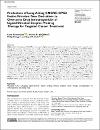Production of Long-Acting CNGRC–CPG2 Fusion Proteins: New Derivatives to Overcome Drug Immunogenicity of Ligand-Directed Enzyme Prodrug Therapy for Targeted Cancer Treatment
| Author | Al-Mansoori, Layla |
| Author | Al Qahtani, Alanod D. |
| Author | Elsinga, Philip |
| Author | Goda, Sayed K. |
| Available date | 2021-11-29T11:43:02Z |
| Publication Date | 2021-11-20 |
| Identifier | http://dx.doi.org/10.1177/15330338211057371 |
| Citation | Al-mansoori L, Al Qahtani AD, Elsinga P, Goda SK. Production of Long-Acting CNGRC–CPG2 Fusion Proteins: New Derivatives to Overcome Drug Immunogenicity of Ligand-Directed Enzyme Prodrug Therapy for Targeted Cancer Treatment. Technology in Cancer Research & Treatment. January 2021. doi:10.1177/15330338211057371 |
| Abstract | Objectives: Aminopeptidase N (APN) is an enzyme highly expressed in metastatic cancers and could be used in targeted cancer therapy. Our previous work showed the successful construction of CNGRC–carboxypeptidase G2 (CPG2) and CNGRC–CPG2–CNGRC fusion proteins. Our conjugates and prodrugs were effective in targeting high APN-expressing cancer cells. In the present study, we aim to produce long-acting fusion proteins to overcome 2 of the main drawbacks of antibody-directed enzyme prodrug therapy. Methods: N-terminal and N-, C-terminal fusion CPG2, CNGRC–CPG2, and CNGRC–CPG2–CNGRC, respectively, were PEGylated using polyethylene glycol (PEG) maleimide (40K). We examined the effect of PEGylation on the therapeutic efficacy of the new products. The resulting PEGylated fusion proteins were tested for their stability, ex vivo immunotoxicity, binding capacity to their target on high HT1080, and low A549 APN-expressing cells. The catalytic activity of the resulting PEGylated fusion CPG2 proteins was investigated. Pro-drug “ZD2767P” cytotoxic effect in association with PEG CPG2–CNGRC fusion proteins on cancer cells was studied. Results: Our work demonstrated that the properties of the PEGylated single-fused proteins were significantly improved over that of un-PEGylated fused CPG2, and its kinetic activity and APN-binding affinity were not negatively affected by the PEGylation. Significantly, The PEGylated single-fused CPG2 had lower immunogenicity than the un-PEGylated CPG2. Our results, however, were different in the case of the PEGylated double-fused CPG2. Although its stability in human serum under physiological conditions was not significantly affected, the kinetic activity and its binding affinity to their cellular marker (APN) were substantially reduced. When the study was performed with high and low APN-expressing cancer cell lines, using the prodrug ZD2767p, the PEGylated fusion CPG2 demonstrated cancer cell killing effects. Conclusion: We have successfully produced PEGylated-CNGRC–CPG2, which is bioactive and with lower immunogenicity in ligand-directed enzyme prodrug therapy for cancer treatment. |
| Language | en |
| Publisher | SAGE |
| Subject | PEGylated CPG2 conjugates ligand-directed enzyme prodrug therapy targeted cancer therapy aminopeptidase N long-acting drugs |
| Type | Article |
Files in this item
This item appears in the following Collection(s)
-
Biomedical Research Center Research [689 items ]


